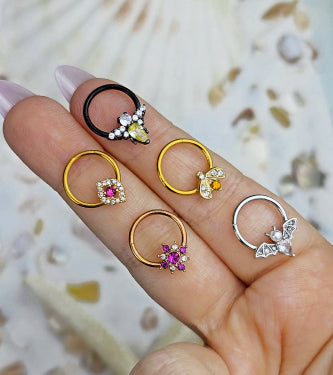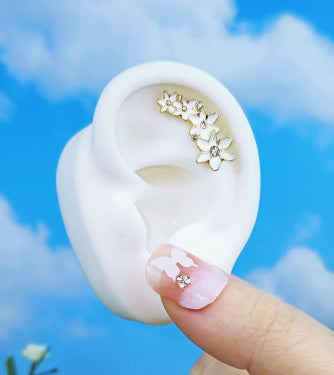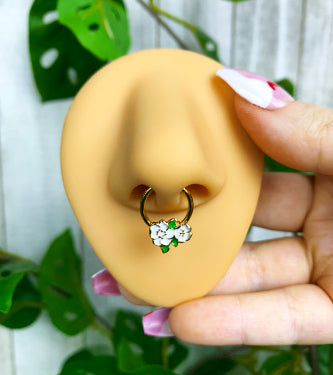Considering getting your first piercing? For some people it’s a right of passage, for others it may mark a life event, or be the doorway to an individual finding themselves. Whatever your reasoning, there a few things to consider and some vital information you need before you make your choice.
The two factors when thinking about a piercing you need to consider are Anatomy (physical structure) and Aesthetics (physical appearance). Your piercer will be able to help you determine if your desired piercing is anatomically possible for your body. Try not to get too keen on one particular piercing until you consult with the piercer. Should your body be accommodating physically the decision ultimately lies with you whether or not you think the piercing will compliment your appearance. Piercings can be used to draw attention to a certain area or detract unwanted attention from a less desirable feature. Draw focus to the lips with a ring or stud for example. The most important thing is that you like the piercing and the way it looks on you.
Once you’ve decided on what piercing you want and have consulted your piercer it’s time to prepare yourself!
Make sure you have all of your aftercare supplies on hand and ready before you go.
A few things to buy may include:
- Non-iodized sea salt (finely ground dissolves easier in water)
- Mild anti-microbial soap
- A container for soaking your piercing (a shot glass works well)
- Alcohol-free antiseptic mouth wash (crest pro-health as an example)
- Pads or panty liners if you’re getting a genital piercing
- Popsicles to help with swelling from an oral or tongue piercing
A few things to bring with you to your appointment:
- Your identification ( Commonly accepted forms are Driver’s license, Passport, Military ID, State issued ID, and Foreign government id with photo)
- A snack and/or drink such as fruit and juice to stabilize your blood sugar after
- A friend! Don’t be afraid to bring one friend with you if you need moral/ emotional support, just don’t bring a crowd as it makes the piercer’s job more difficult, but be sure to ask if the piercer minds your having company with your for the procedure
Be sure to eat beforehand as well! Many people forget to eat in their anxiousness and end up feeling light headed or passing out from the dip in blood sugar level getting pierced causes. A light snack one to two hours before should do the trick, but a heavy meal is best avoided as you may experience nausea or vomiting.
Things to avoid:
Pay attention to your physical condition. If you’re not feeling well you should post-pone your appointment, it’s easier for your body to heal while you’re healthy. Avoid drinking heavily the night before, having a hangover will make you more sensitive to pain and may cause excessive bleeding as alcohol thins the blood. Do not take aspirin, Advil(ibuprofen), or Aleve(naproxen) beforehand. These are also blood thinners. Many piecers recommend Motrin after the piercing is performed to reduce swelling.
Relax. Do something to take your mind off your upcoming appointment, practice slow deep breathing. Remind yourself that the actual piercing will only take but a few seconds, any discomfort should pass quickly.
At the Studio
Cost- “Why are piercings so expensive they’re just jabbing me with a needle?” Piercings are costly because body piecers go through long periods of training, knowing where major veins and arteries are is one of many crucial factors when placing a piercing. The supplies such as high quality surgical grade steel, the needles, and the auto-clave (the machine used to sterilize tools, jewelry, etc) are very costly. When choosing a piercing studio don’t just go for the best price, go for which shop has the best reputation. Check out online reviews and ask around to see what the public’s general consensus is.
Don’t Touch Anything!
Everything within the piercing room must be sterilized and your hands can contaminate the tools or other surfaces, so if you really feel the need to handle a piece, ask first!
Before the actual piercing, the piecer will take your ID and make a copy of it for their records. You will also have to fill out a waiver, be sure to answer all medical questions thoroughly and honestly. Once in the piercing room you may, depending on the location of the desired piercing, has to remove some clothing items. A good piercer will always be professional when dealing with the exposed human form. Don’t worry too much about your body, the piercer is here to guide you and give you a safe, pleasant experience. They won’t be judging you on your body type or looks.
The Piercing
The piercer will mark the desired area with a temporary ink and have you look at the projected placement in the mirror so you can decide if that location is what you want, don’t be afraid to ask them to change it! Once the mark has been approved it’s finally time, the piercer should put on clean gloves before handling any tools. Often times for many piercings a clamp is used to ensure an accurate piercing. The piercer may ask to to deep breathe in and then out as they push the needle through, this is very brief and possibly sharp sensation passes quickly. Then, the jewelry will be inserted as the needle is pushed out, this may be more uncomfortable than the actual piercing, just breathe deeply and relax. The area will be cleaned and you’re done!
You may experience some light headedness from the rush of endorphins and adrenaline, sit or lie as long as you need to afterwards until you feel comfortable moving. If you brought a snack or drink, now is a good time to consume them to stabilize your blood sugar. Also you may take the Motrin if you brought some. Make sure to listen to the aftercare instructions from your piercer, and don’t be afraid to call them or stop in if you have any issues or questions.
Don’t forget to tip your piercer either!





